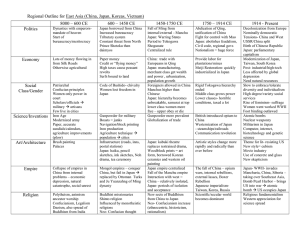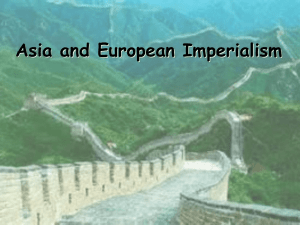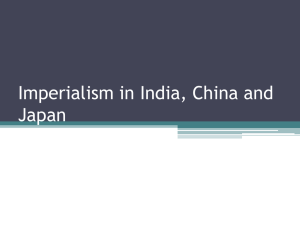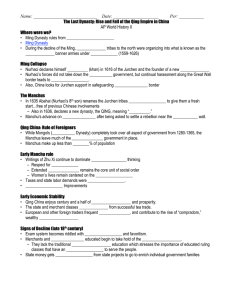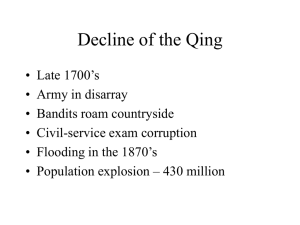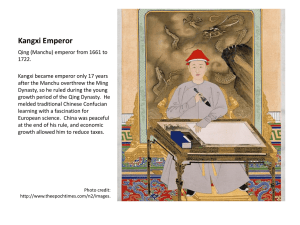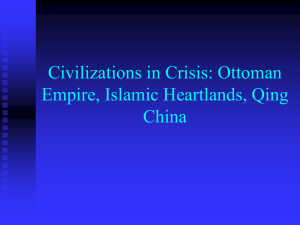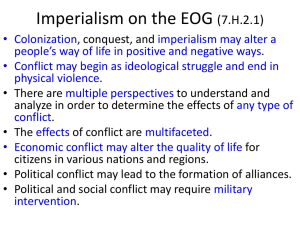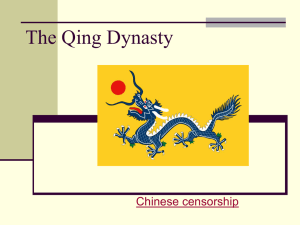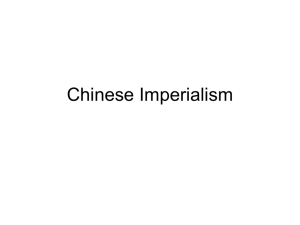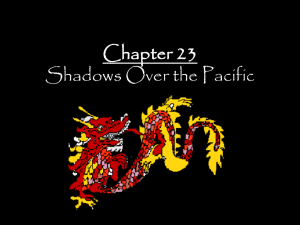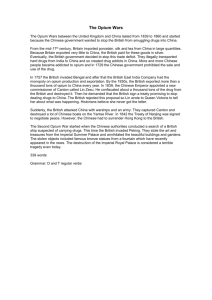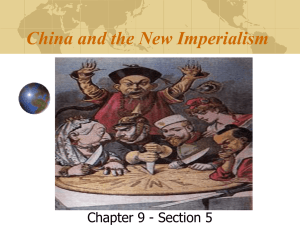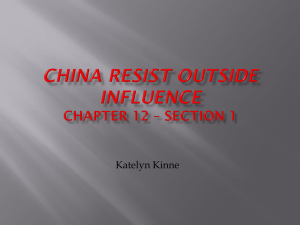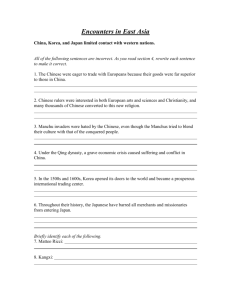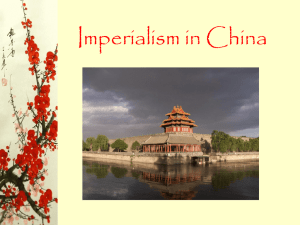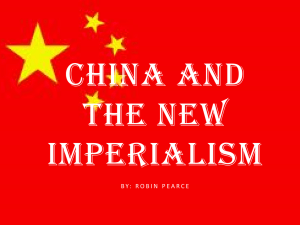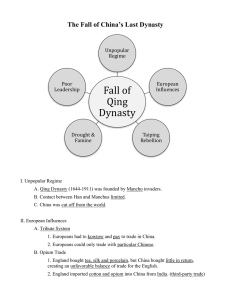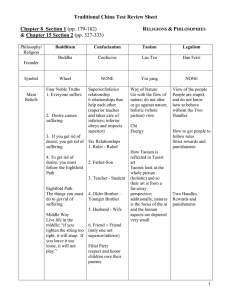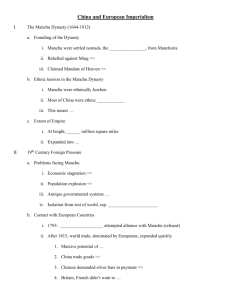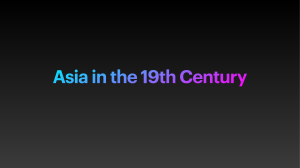Asia in Transition
advertisement
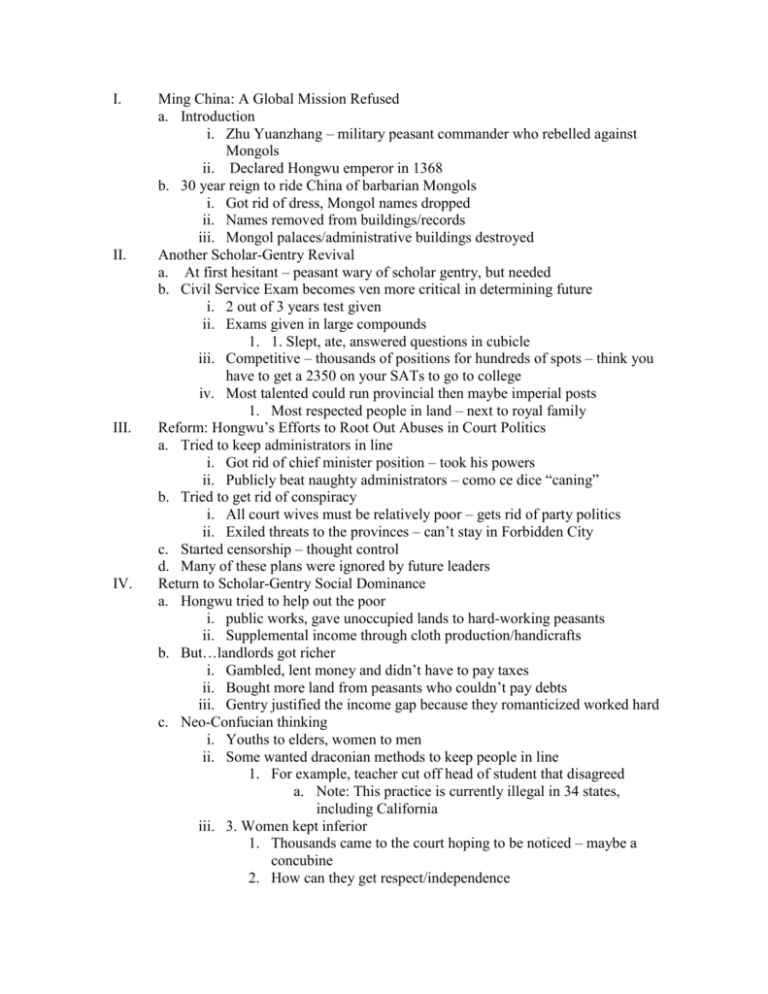
I. II. III. IV. Ming China: A Global Mission Refused a. Introduction i. Zhu Yuanzhang – military peasant commander who rebelled against Mongols ii. Declared Hongwu emperor in 1368 b. 30 year reign to ride China of barbarian Mongols i. Got rid of dress, Mongol names dropped ii. Names removed from buildings/records iii. Mongol palaces/administrative buildings destroyed Another Scholar-Gentry Revival a. At first hesitant – peasant wary of scholar gentry, but needed b. Civil Service Exam becomes ven more critical in determining future i. 2 out of 3 years test given ii. Exams given in large compounds 1. 1. Slept, ate, answered questions in cubicle iii. Competitive – thousands of positions for hundreds of spots – think you have to get a 2350 on your SATs to go to college iv. Most talented could run provincial then maybe imperial posts 1. Most respected people in land – next to royal family Reform: Hongwu’s Efforts to Root Out Abuses in Court Politics a. Tried to keep administrators in line i. Got rid of chief minister position – took his powers ii. Publicly beat naughty administrators – como ce dice “caning” b. Tried to get rid of conspiracy i. All court wives must be relatively poor – gets rid of party politics ii. Exiled threats to the provinces – can’t stay in Forbidden City c. Started censorship – thought control d. Many of these plans were ignored by future leaders Return to Scholar-Gentry Social Dominance a. Hongwu tried to help out the poor i. public works, gave unoccupied lands to hard-working peasants ii. Supplemental income through cloth production/handicrafts b. But…landlords got richer i. Gambled, lent money and didn’t have to pay taxes ii. Bought more land from peasants who couldn’t pay debts iii. Gentry justified the income gap because they romanticized worked hard c. Neo-Confucian thinking i. Youths to elders, women to men ii. Some wanted draconian methods to keep people in line 1. For example, teacher cut off head of student that disagreed a. Note: This practice is currently illegal in 34 states, including California iii. 3. Women kept inferior 1. Thousands came to the court hoping to be noticed – maybe a concubine 2. How can they get respect/independence V. VI. VII. VIII. a. Have male children – which is hard due to the XX chromosome issue b. Become a mother-in-law and then treat daughter-in-law like garbage c. Become courtesan – talented young lady who entertained men – step above prostitution An Age of Growth: Agriculture, Population, Commerce and the Arts a. Population increased due to improved diet i. Maize, sweet potatoes, peanuts – that’s why they have peanuts on the table in Chinese restaurants 1. Less susceptible to droughts ii. Could be grown on hilly, marginal land b. Controlled terms of trade i. Porcelain, silk textiles, tea, ceramics, lacquerware in demand 1. Tons of American silver ended up in China ii. Europeans could do trade in Macao and Canton 1. Merchants obviously benefited 2. But…gov’t got taxes and officials got bribes/favors c. Money spent on the arts – patrons i. Court, city, country life as focus – landscapes still important ii. Literature – novels start being created The Last Dynasty: The Rise and Fall of the Qing Empire in China A. Introduction a. China’s isolation and disdain for outside world comes back to haunt them i. After century of successful Manchu rule, government turns corrupt/ineffective b. Manchus – Nurhaci – 1559-1626 organized nomads, unites tribes, attacks Northern China i. Elite begin adopting Chinese ways ii. Manchus actually invited in by the Ming to help put down a rebellion 1. They end up invading Beijing in 1644, and then pushed South 2. Forced submission of nomadic peoples on west, tribute from south Kingdoms 3. Took on dynasty name of Qing iii. c. Allowed Chinese scholar gentry to maintain influence 1. Though Manchus – only 2% of population – clearly took over power iv. d. Unlike Mongols… 1. Retained examination system a. Let sons take courses 2. Most recent Son of Heaven – adopted ideology 3. Practiced traditional Confucian virtues 4. Patrons of the arts Economy and Society in the Early Centuries of Qing Rule a. Manchu maintained Chinese social structure i. Respect/acceptance for rank/hierarchy IX. X. ii. Suspicion of other social organizations – guilds/secret societies iii. Women treated poorly 1. Infanticide increases – men actually outnumber women a. A financial drain on the household – dowry 2. Males marry women below them in social status – male control 3. Only power in elite households – maybe control other women/younger men b. Focused on making lives better for farmers i. Tax breaks for those that resettle lands ii. Tax/labor demands lowered iii. Money spent on repairing infrastructure c. But…landlords become dominant i. Supply and demand – more peasants than land – owners control terms ii. Nobles prove status by clothes/carried in sedan chairs 1. Some even grow nails long – don’t have to work – not nasal cleansing d. Loosen control of commerce – actually makes gains i. New ways of financing ii. Lucrative markets for traders 1. Wealthy new group of merchants – compradors Rot from Within: Bureaucratic Breakdown and Social Disintegration a. But then things start to fall apart i. Exam system riddled with cheating/favoritism 1. Bribes examiners, scholars paid to take exam for the rich 2. Sons of officials put in places of power – nepotism vs. meritocracy 3. Merchants/landowners put in power a. Lack the Confucian values 4. Bureaucracy became means of improving lives of wealthy/not poor ii. Money given to wealthy families, not for infrastructure 1. Money taken from military – left unprotected 2. Unrepaired dikes destroy land > famine and disease iii. Widespread migration – banditry, vagabonds b. 2. Why wasn’t this dynasty merely replaced by another? Key points!!! i. Ming era brought in American crops – population explosion ii. Refusal to bring in technological innovations to satisfy this population iii. Corruption and conservative Manchus prevented needed changes iv. Also, different “barbarians” - Westerners Barbarians at the Southern Gates: The Opium War and After a. Europeans larger threat than nomads – technology makes up for numbers b. Europeans had to find a way to balance trade i. Bad – silks, fine porcelains, tea for silver bullion ii. Good – let’s get them addicted – how about to Indian opium? c. Chinese a bit upset about opium trade i. Sapping economy of bullion – can’t pay for public works ii. Plus – people get addicted – 1% addicted to drug, opium dens, officials useless XI. XII. d. For years, laws against opium not enforced until… i. Lin Zexu enforces the laws ii. Blockades Canton from European traders – warehouses searched 1. Opium confiscated and destroyed iii. Surprisingly, Europeans annoyed – property rights being infringed 1. Easily won naval, land war of 1839-1841 iv. From victory – China forced to open ports – not just Canton/Macau anymore 1. 90 ports – 300,000 traders by 1890s e. China treated as subservient to Europe after 1850 i. No protective tariffs to protect Chinese manufacturing ii. Had to accept European ambassadors in court – as equals iii. Opium trade rolls in unchecked A Civilization at Risk: Rebellion and Failed Reforms a. Rebellions go on across the land i. Christian, yet psycho prophet Hong Xiuquan leads the Taiping Rebellion 1. Promised social reform, land redistribution, liberation for women 2. Attacked Confucian values – wanted to create simpler script a. Make literacy more possible for everyone 3. Eventually local landowners create military that stops rebellion a. Plus…Hong Xiuquan losing his mind ii. Manchu rulers refuse to institute necessary reforms iii. End of dynasty – final straw was Cixi – powerful empress 1. Imprisons nephew in Forbidden City 2. Spends money on fancy marble boat, not on military iv. Boxer Rebellion – 1989-1901 – European, American, Japanese put down 1. Boxers trying to end foreign economic/political control 2. Insult to injury – gov’t then has to pay EAJs for their losses The Fall of the Qing: The End of a Civilization? a. Secret societies start popping up i. Yes…you’ve all heard of the dreaded White Lotus, Triads and Society of Elders and Brothers 1. Failed amazingly – no $ and poorly organized 2. But…set precedent…became training ground for future rebellions b. Some Western-educated leaders support a Europeanesque political reform c. Rising middle class i. Mad at Manchus and foreigners 1. Cut off queues – no not a bank line – that insulting little ponytail thing d. Finally in 1911 – students + mutinies from imperial troops + secret socities uprising i. Puyi forced to abdicate thrown – last emperor anyone? e. 1905 – Civil service exam given for last time – don’t cry…it’s over i. Can’t solve China’s problems with Confucian ideals from 2500 years ago ii. End of the Confucian system – violently destroyed 1. Massive civil bureaucracy 2. Rule by educated/cultivated scholar-gentry 3. Artistic accomplishments of old now criticized
